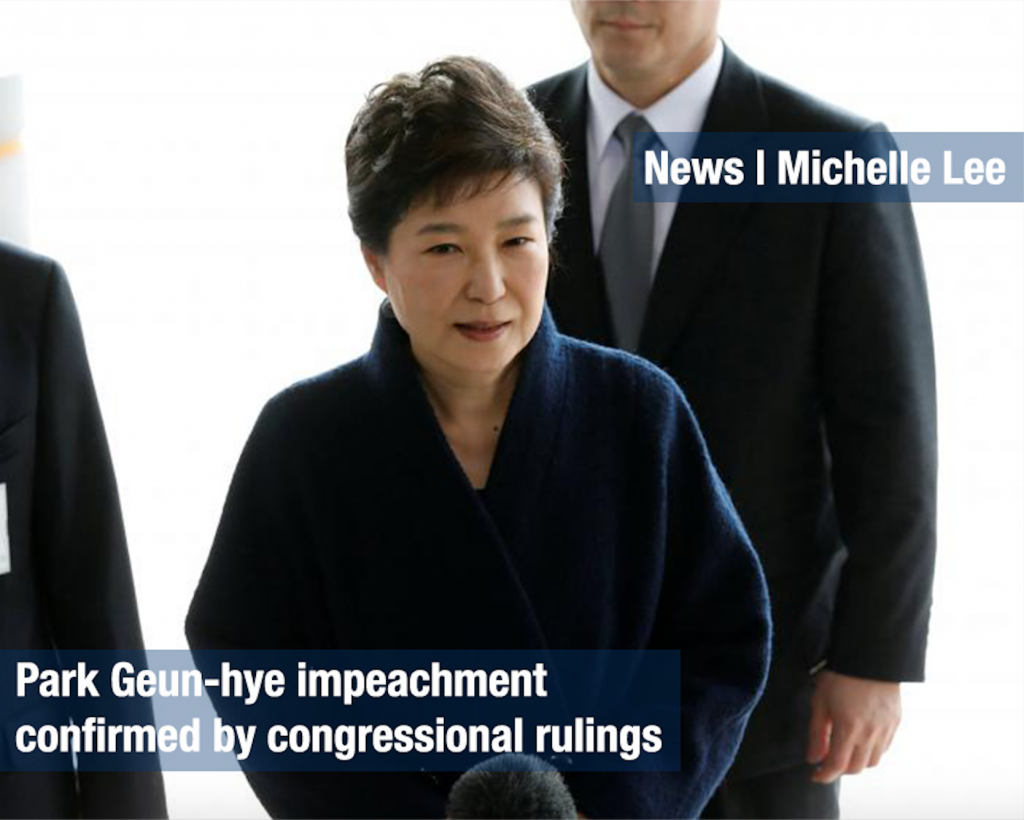South Korea’s congressional court announced a unanimous 8-0 decision to uphold the impeachment of the country’s president Park Geun-hye on March 10, marking a historical moment for both supporters and oppositionists of the first successful impeachment in the country. Back in December, an overwhelming number of South Korean lawmakers and the Congress had voted for her removal from office, taking the case to the national congressional court. The eight justices of the court were granted 180 days to go over the scandals and accusations, finally deciding to unseat Park for committing “acts that violated the Constitution and its laws.” By law, Korea must hold a presidential election within the next 60 days and restore official leadership in the democracy. Prime minister Hwang Kyo-ahn has taken over the presidential duties in the meantime, until the planned election on May 9.
The fall of South Korea’s first female president was primarily due to corruption scandals with confidante Choi Soon-sil along with ties with large conglomerates like Samsung. Choi was indicted on charges of having manipulated the president’s agenda for personal financial gain along with conspiring with large companies to donate billions into two nonprofit organizations that Choi set up. Park was furthermore accused of allowing her friend to influence state policies and the leaking security documents to Choi, including South Korea’s stance on North Korea’s nuclear programs. Recent investigations regarding the Sewol Ferry incident in 2014 further tarnished her reputation, as questions are still being made as to what the president was doing during the critical few hours after the ferry had sunk. According to the New York Times, the president appeared to be absent as the ferry sank and did not deliver orders until seven hours later. To Park, the impeachment means the nullification of a president’s immunity to criminal indictment under the Korean law, which opens way for prosecutors to carry out with criminal proceedings.
“The impeachment reminded me of the power and the extent in which a collective majority’s voice can influence government/society,” said Sky Park (11), MUN member. “The demographic of Park’s supporters clearly illustrate one of the growing problems of Korea, which is a generation gap, where the ideologies of previous generations are starkly different from ours.”
According to the Korean Times, reactions from the citizenry have been on both ends of the spectrum. To the majority of the nation that has been demanding impeachment on the streets ever since the first corruption allegations arose, the decision epitomized the strength and victory of public opinion in a democracy. Millions cheered in front of the Blue House when the decision was broadcasted on live television, especially a bittersweet relief for families involved in the Sewol Ferry incident. Hundreds of thousands gathered anxiously outside on Gwanghwamun Square the day of the ruling, and while most were marching for the impeachment, there were also a handful of people violently crying out for her stay in office. Angry protests from Park’s supporters resulted in three deaths due to clashes with the police, and rallies even continued over the next week after the decision was made.
As the Times anticipates, this impeachment is expected to shift South Korea’s ruling political party to the opposition, the Minjoo Party of Korea, whose platforms are well known to want more engagement and interaction with North Korea. Parliamentary lawyer Kwon Sung-dong claims that the historic verdict was also a symbolic defiance against the monopoly of chaebol companies that for far too long have been granted benefits through ties with political parties and bribes. Based off the nation-wide reaction, the impeachment marks a revolutionary point in the fate of South Korea, and many speculate the impact this result will have in bringing drastic changes in the nation’s government and society.

